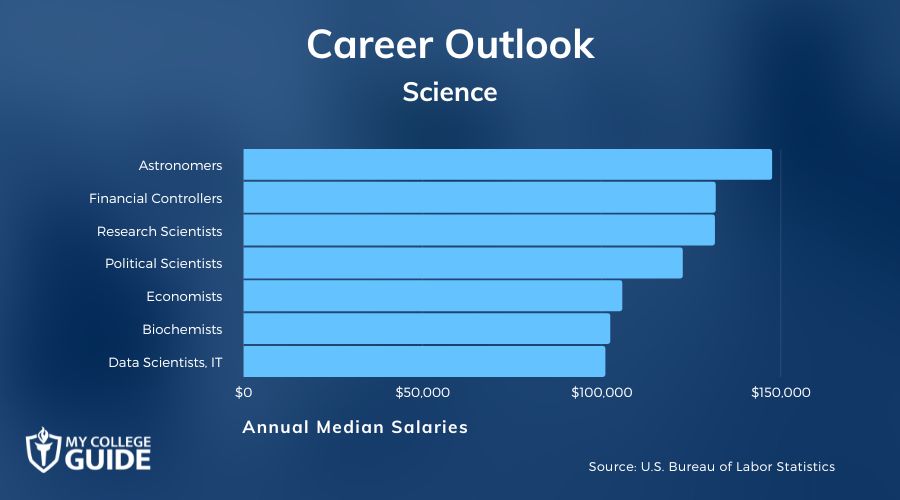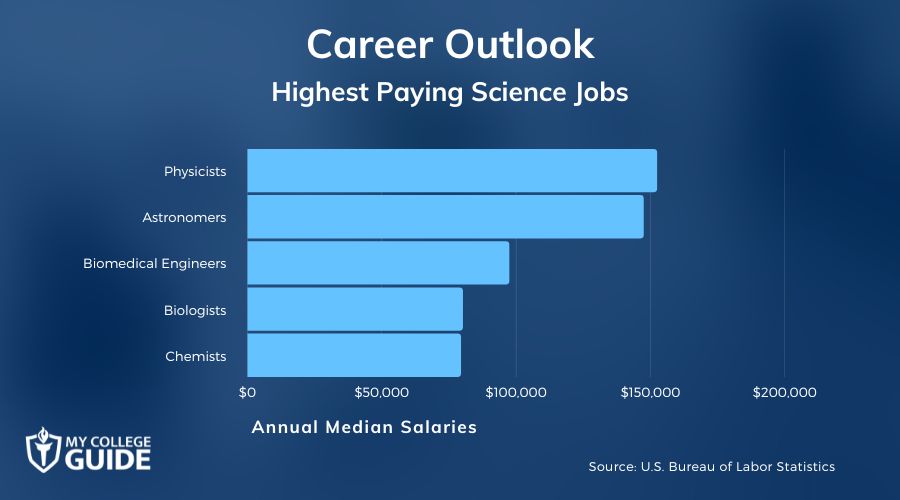If you enjoy studying complex systems and want to make an impact while improving the world we live in, consider pursuing a degree in one of many exciting science careers.

Science is an expansive field and runs the gamut from medical research to environmental studies and economic experts.
Editorial Listing ShortCode:
A science degree can give you a multitude of options to make a career out of your passions!
What Can You Do With a Science Degree?

The science field covers life, physical, and social science, leaving students interested in science-related work with a number of choices for degree specialization.
Whether you want to have a part in developing new medical equipment and treatments or enjoy consulting with companies to help them succeed, the options are endless for opportunities to utilize your science degree. Science careers range from biologists to environmental scientists, to geographers and astronomers.
The field of science allows you to follow your passion and help make a difference in the world at the same time. Environmental scientists help study the environment and earn an annual median salary of $47,370, while geographers help to study the Earth’s land, features, and inhabitants, and earn a median salary of $85,220.
Editorial Listing ShortCode:
The annual median salaries are based on data provided by the U.S. Bureau of Labor Statistics. Like most careers, the salary for science jobs is largely dependent on your amount of schooling and experience, so you may make more or less than the median pay listed above.
5 Things You Can Do with a Degree in Science
Earning a degree in science may lead to numerous high-paying careers. Science degree jobs vary, and you may even go on to become a biochemist, epidemiologist, psychologist, forensic science technician, or wildlife biologist.
If you seek to gain a greater perspective on what a science degree may make available to you, continue reading to gain some clarity.
1. Biochemist

Biochemists are responsible for studying the biological processes of living organisms. They take their knowledge of chemicals and use it to perform various experiments that help them determine biological problems.
A biochemist’s daily work may involve conducting research to learn how cells communicate, divide, and grow. To accomplish this, they may use x-rays, computer modeling software, or other advanced forms of technology.
2. Epidemiologist

An epidemiologist is a scientist that examines the root cause of a disease to help prevent them from spreading or recurring. Oftentimes, epidemiologists work in hospitals, laboratories, or universities. Hospitals regard these officials as public health officers.
An epidemiologist’s work may involve conducting infection surveillance, which means analyzing data and determining where problems may arise, as well as how to intervene. Epidemiologists perform vital research that improves the health and safety of healthcare workers, patients, and society at large.
3. Psychologist

Psychologists observe the way patients think and behave to gain insights that they then provide the patient with so that they can better their life. Psychologists can guide an individual towards a more positive, healthy life.
There are different types of psychologists, ranging from clinical to forensic, but they all bear similarities. For instance, psychologists generally study emotional and social processes to gain insight into how people relate to their environment. A psychologist’s work may involve conducting research or interviews and performing tests to help predict behavior.
4. Forensic Science Technician

Forensic science technicians are responsible for aiding criminal investigations by gathering and studying the evidence.
The responsibilities of a forensic science technician vary depending on the setting. If they work in a crime scene then their responsibilities could include determining what evidence to collect, making sketches, or reconstructing crime scenes.
Editorial Listing ShortCode:
Those that choose to work in a laboratory may conduct chemical or biological analyses, explore connections between suspects and the crime, or consult with other experts about the crime.
5. Wildlife Biologist

Wildlife biologists study how animals behave, their general characteristics, and how humans affect their habitats. On a daily basis, wildlife biologists may conduct experimental studies involving animals, collect biological data, and research ways to improve breeding programs that support animals.
Wildlife biologists are animal lovers and value the work that they do because it allows them to make a difference by studying the growing impact of humans on the planet. While there are many other career options, the above 5 are among the top options for consideration.
Science Careers & Salaries

There are many science-related career ideas that you can pursue after earning a specialized degree in the field. To give you an idea of the breadth of choices, we have put together a list of the top 40 science careers & salaries according to the U.S. Bureau of Labor Statistics.
| Careers | Annual Median Salaries |
| Astronomers | $147,450 |
| Financial Controllers | $131,710 |
| Research Scientists | $131,490 |
| Political Scientists | $122,510 |
| Economists | $105,630 |
| Biochemists | $102,270 |
| Data Scientists, IT | $100,910 |
| Fire Protection Engineers | $99,040 |
| Meteorologists | $94,570 |
| Sociologists | $92,910 |
| Geographers | $85,220 |
| Hydrologists | $84,030 |
| Petroleum Geologists | $83,680 |
| Biologists | $82,530 |
| Environmental Scientists, Physical | $82,090 |
| Materials Scientists | $79,760 |
| Chemists | $79,430 |
| Microbiologists | $79,260 |
| Epidemiologists | $78,830 |
| Nuclear Medicine Technologists | $78,760 |
| Urban Planners | $78,500 |
| Food Scientists | $78,340 |
| Environmental Protection Specialists | $76,530 |
| Environmental Consultants | $75,810 |
| Zoologists | $64,650 |
| Foresters | $64,110 |
| Historians | $63,940 |
| Soil Conservationists | $63,750 |
| Nuclear Medicine Technologists | $61,950 |
| Forensic Science Technicians | $61,930 |
| Archaeologists | $61,910 |
| Electricians | $60,040 |
| Survey Researchers | $59,740 |
| Clinical Laboratory Technicians | $57,800 |
| Archivists | $50,120 |
| Chemical Technicians | $48,990 |
| Environmental Technicians | $48,390 |
| Biology Laboratory Assistants | $48,140 |
| Exercise Physiologists | $47,940 |
| Agricultural Technicians | $40,430 |
As you can see from the table above, there are several ways to use your science degree to create a rewarding and challenging career.
The overall trend for science-related occupations is positive, and this is largely due to the development of new technology and the advancement of scientific discoveries. The U.S. Bureau of Labor Statistics is an excellent resource for gathering various data on specific science career paths, including job outlook, annual salaries, and occupational responsibilities.
Editorial Listing ShortCode:
The BLS shows that the science career outlook in life, physical, and social sciences is expected to experience a projected growth of 7% over the next 10 years, resulting in an estimated 98,700 new jobs within the field. Earning a degree in science opens the door to a wide range of Bachelor of Science jobs and other job opportunities that allow you to make an impact on the world around you.
From business to medicine, skilled scientific professionals are in high demand to help our world advance to the society of the future.
Common Science Majors

Science is a broad category full of many different majors. To help you find the one that fits your goals, here is a list of a few sample majors:
- Agriculture: This is the study of agricultural production, farming, and livestock.
- Astronomy: Students study the history of the universe and the celestial objects that comprise it.
- Biology: This major focuses on the science that pertains to living organisms.
- Chemistry: Students study the composition and behavior of matter.
- Genetics: Students study genes and the molecular properties of life.
- Computer Science: Students learn how to understand computers and programming.
- Management Science: This major involves the application of analytical tools and models to help inform an organization’s performance.
- Biochemistry: This major is focused on the study of life at a molecular level.
- Behavioral Economics: Students are taught to predict economic decision-making through the use of psychological principles.
- App Development: Students are taught to design, develop, and improve apps across devices.
The above list doesn’t encompass all the available majors, but it should give you an idea of the subjects that you can study if you were to pursue a career in science. Additionally, many of the above majors are science degrees that pay well.
Alternative Careers in Science

It’s not uncommon for graduates to shift careers at some point in their journey. Fortunately, science degrees teach students valuable skills that allow them to make this transition. Here’s a list of some alternatives to some of the best science jobs:
- Patent Lawyer: These are lawyers who represent clients for patent-related issues, including licensing, infringement, and re-examination.
- Professor: A professor is responsible for teaching students a given subject at a high level.
- Health and Safety Inspector: These are professionals who survey restaurants, stores, and other locations to ensure that the business is operating smoothly.
- Marketing Manager: These individuals are responsible for developing and implementing marketing plans across an organization.
- Science Policy Maker: These individuals are the bridge between policymakers and researchers.
- Biotech Sales Representative: These are people who sell pharmaceutical products or vaccines.
- Business Development Manager: These people work to grow an organization through strategic planning and sales management.
- Science Copywriter: A science copywriter conveys complex science-related topics to the general public to accomplish marketing goals.
- Science Journalist: A science journalist reports science news to the general public.
- Technical Writer: Technical writers craft instruction manuals, journal articles, and other complex documents within science-related fields.
It should be noted that there are a variety of factors that affect the careers that may be available to you. While these may be viable options, it’s important to note that no career can be guaranteed.
What Is a Science Degree?

A science degree is a degree that specializes in a field related to science, technology, engineering, or mathematics.
The majority of colleges offer a number of degree programs related to the field of science, giving students a wide range of choices for specialization. Some of the best careers in science may only require an associate’s degree or certificate, while top-level science professionals often have completed rigorous graduate degree programs.
Editorial Listing ShortCode:
The degree that you choose to pursue depends largely on your future goals and interests. For example, if you are interested in studying humanity, then sociology or anthropology may be the right degree program for you. If the medical world interests you, then you can pursue degree paths that involve research, treatment, and diagnosis of new medical technology.
A few of the most popular scientific degrees available include the following:
- Computer science
- Biology and biotechnology
- Fire science
- Nutritional science
- Physics
- Veterinary science
- Geographic information systems
- Economics
With advances in technology, it is now possible to earn many science degrees right from the comfort of your own home. Reputable colleges across the country offer online science degree programs that combine the flexibility of on-demand scheduling with instruction from top experts in scientific fields.
What Are the Highest Paying Science Jobs?

Some of the best science careers are often in-demand and high paying. According to the Bureau of Labor Statistics, here are some of the top high paying science jobs.
| Careers | Annual Median Salaries |
| Physicists | $152,430 |
| Astronomers | $147,450 |
| Biomedical Engineers | $97,410 |
| Biologists | $80,140 |
| Chemists | $79,430 |
There are many jobs for science majors, but having a science degree doesn’t guarantee these careers. There are many factors that affect career prospects, but it is worth knowing these are science jobs that pay well and that you can strive for.
Is Science a Good Career?

Yes, science is a good career for many professionals. When you decide to study science in college, you open the doors for many potential careers. There are many different major options at your disposal, as well as numerous science careers in demand.
As mentioned, a biomedical engineer is one of the highest paying careers in science. According to the Bureau of Labor Statistics, biomedical engineers are expected to rise by approximately 10% over the next 10 years, which is faster than average.
Editorial Listing ShortCode:
The skills you learn from a science degree are often transferable to other careers. If you are seeking job stability and high earning potential, then studying science may be right for you.
Getting Your Degree in Science Online

Choosing a degree path, and then a career path, can be a challenge for many people. Careers in science often allow for a degree of flexibility and stability since the careers it makes available tend to be in-demand and high paying. Many people can benefit from pursuing science.
Careers in science may give you purpose as you help the environment, contribute essential research to an organization, or aid in an active investigation. The possibilities are endless when you pursue a degree in science.
If a degree in science seems interesting to you and matches your career goals, you can begin researching accredited universities and get started today.
You can also view our Careers in Psychology and Careers in Social Work guides for more options.
